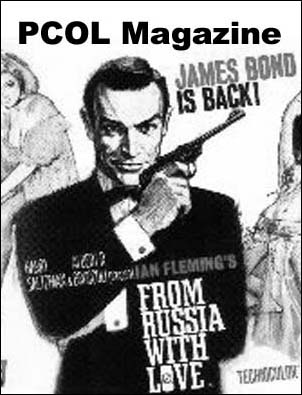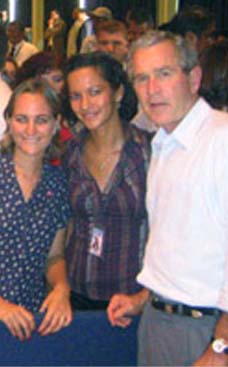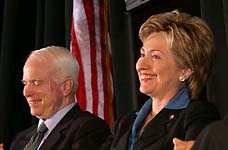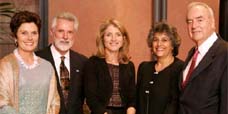
The director of the Federal Security Service, Nikolai Patrushev, went even further earlier this year. He accused Western organizations - including the Peace Corps and the British medical charity Merlin - of being fronts for espionage. "Under the cover of implementing humanitarian and educational programs in Russian regions, they lobby for the interests of certain countries and gather classified information on a wide range of issues," Mr. Patrushev told parliamentary deputies in May, referring to non-government organizations. His remarks prompted unusually strong rebukes from the United States and Britain, but the legislation he called for at the time became the basis for what Parliament endorsed today.
Russia moves to impose greater government control over charities and other non-governmental organizations
Russian Bill Would Ban Offices of Rights Groups
By STEVEN LEE MYERS
Published: November 23, 2005
MOSCOW, Nov. 23 - Russia moved today to impose greater government control over charities and other non-governmental organizations, including some of the world's most prominent, in what critics described as the Kremlin's latest effort to stifle democracy.
The lower house of Parliament gave preliminary approval to legislation that would require tens of thousands of Russian organizations to register with the Ministry of Justice, impose restrictions on their ability to accept donations or hire foreigners and prohibit foreign organizations from opening branches in Russia.
The legislation could yet be significantly revised, but if passed, as now written, it would force organization like the Ford Foundation, Greenpeace or Amnesty International to close their offices here and reregister instead as purely Russian organizations - something the legislation, in an apparent contradiction, appears to disallow.
President Vladimir V. Putin has long faced criticism for strengthening his political authority, despite his avowed commitment to democracy, and the legislation prompted still more.
"This is the last sector of civil society that has not fallen under government control," Aleksandr B. Petrov, the deputy director in Moscow for the international group Human Rights Watch, said at a news briefing Tuesday in hope of persuading Parliament to reject or at least amend the legislation.
Although some of the bill's supporters defended it as an effort to bring order to the registration of 450,000 non-governmental organizations, others have said it was aimed at preventing foreign efforts to support political opposition movements, like the one that swept to power after Ukraine's "Orange Revolution" last fall.
The legislation follows sharply worded remarks by Mr. Putin and the director of the Federal Security Service, the K.G.B's successor, that foreign organizations often undermined Russian interests. And it comes in the wake of prosecutions of individual organizations, including the Russian-Chechen Friendship Society, an American- and European-financed group that the government has accused of extremism and has moved to close.
"Let us resolve the internal political problems of Russia ourselves," Mr. Putin said this summer, criticizing non-governmental organizations involved in what he called political activities.
The director of the Federal Security Service, Nikolai Patrushev, went even further earlier this year. He accused Western organizations - including the Peace Corps and the British medical charity Merlin - of being fronts for espionage.
"Under the cover of implementing humanitarian and educational programs in Russian regions, they lobby for the interests of certain countries and gather classified information on a wide range of issues," Mr. Patrushev told parliamentary deputies in May, referring to non-government organizations.
His remarks prompted unusually strong rebukes from the United States and Britain, but the legislation he called for at the time became the basis for what Parliament endorsed today.
Parliament adopted it by an overwhelming 370-to-18 margin; 3 deputies abstained, while 56 did not vote. Parliament's move came despite the outpouring of criticism, at home and abroad, once the bill appeared on the agenda, bypassing the usual committee processes.
The subject was raised during a meeting last week between Presidents Putin and Bush, though neither the Kremlin nor the White House disclosed details. Senator John Edwards and former Congressman Jack Kemp, who together are overseeing a Council on Foreign Relations task force on American policy toward Russia, wrote to Mr. Bush last week urging him to protest "in the frankest possible terms."
"It would roll back pluralism in Russia and curtail contact between our societies," they said.
Under Russia's legislative process, any bill must pass three "readings," or votes. Amendments are often introduced between the first and second, now set for Dec. 9. Such is the state of Russian politics today that some legislators have already suggested that the bill voted on today would face revision, though how remained unclear.
Sergei M. Mironov, the chairman of the upper house, which must also approve the legislation for it to become law, said there was justification for restricting foreign influence on Russian organizations and political activities, but added that it need revisions.
"It is important not to throw out the baby together with the bathwater," he said in an interview in his office.
Steven Solnik, the representative of the Ford Foundation, said in a telephone interview after the vote that he remained hopeful that the restrictions on foreign organizations would be lifted. The foundation, he said, distributed roughly $10 million a year in grants, mostly to Russian organizations and government institutions in a variety of fields, including education, AIDS and the arts.
Even if the restrictions on foreigners are removed, the main components affecting Russian organizations are likely to remain. Leaders of those organizations said the legislation would subject them to constant scrutiny by officials, who would have new powers to demand documents at any time showing that they are not engaged in political activity or other work not specifically allowed in their own charters.
"I think the whole bill is a misguided attempt to bring order, in their minds, to an N.G.O. sector that doesn't need to be put in order, but rather developed," Mr. Solnik said. "It needs a cooperative, mutually trusting environment with the government and not a new law to put it under intrusive government control."
C.J. Chivers contributed reporting from Moscow for this article.














